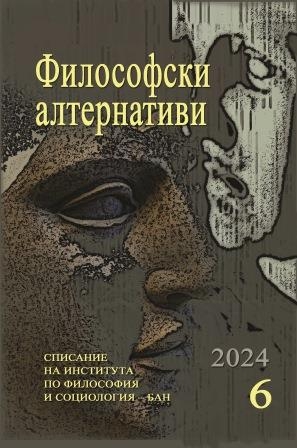„Кронос“ като ум и „Афродита“ като душа в античната антропология. Съкрушената душа в съвременното общество
“Kronos” as Mind and “Aphrodite” as Soul in Ancient Anthropology. The Broken Soul in Modern Society
Author(s): Elitsa DimovaSubject(s): Anthropology, Philosophy, Social Sciences, History of Philosophy, Metaphysics, Special Branches of Philosophy, Ancient Philosphy, Philosophy of Mind, Cultural Anthropology / Ethnology
Published by: Институт по философия и социология при БАН
Keywords: Aristotle; Pythagoras; Philolaus; Hippasus; Architus; Socrates; Plato; Plotinus; Pythagoreans; soul; man; mind; number
Summary/Abstract: The purpose of this article is not to clarify the authenticity and various features of Pythagoreanism, but to trace whether it has an influence on different philosophical currents on how the human being is perceived as two incompatible alternatives – as a transitory form of the animal or as a divine creature. The fact is that there is no clear and consensual definition of what constitutes a person. The separation of soul and body in man as two separate entities belonging to different dimensions is also a concept inherited from antiquity. Matter as evil and soul as good has been a philosophical maxim since the time of Pythagoras. Thus, the human being remains outside the unity of nature as torn into two different entities. They relate to the being, matter and time differently. They express his different natures – the low and the high, the small and the large, matter and ether. The interpretation that soul and body are connected only indirectly and that this makes man imperfect is the root of an erroneous but established notion. In this sense, it is important to rethink from a modern perspective where human perfection lies, such as the right to choose and freedom.
Journal: Философски алтернативи
- Issue Year: XXXIII/2024
- Issue No: 6
- Page Range: 51-57
- Page Count: 7
- Language: Bulgarian
- Content File-PDF

